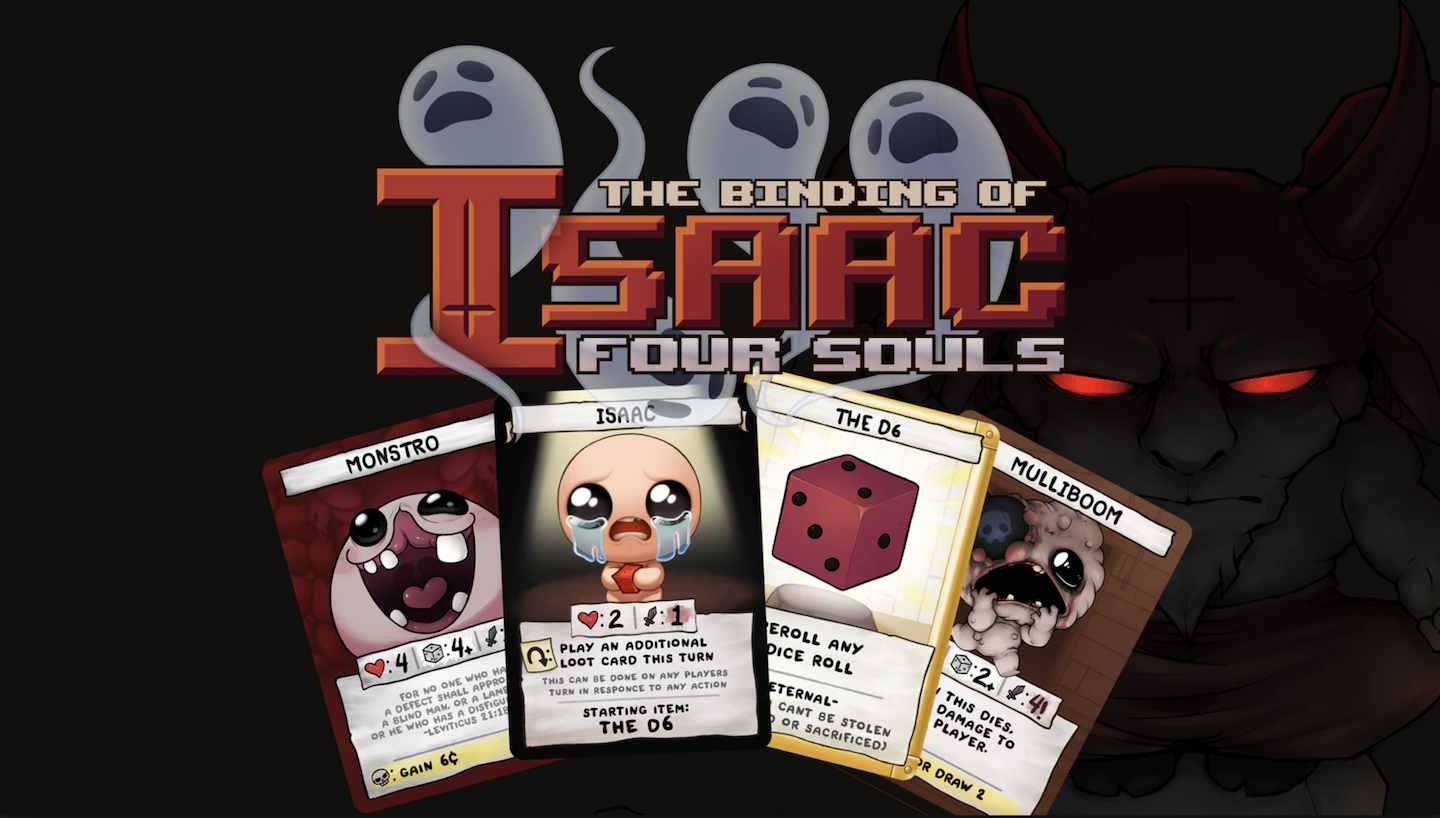
This is Niche Tabletop. In this column, we regularly cover tabletop RPGs and card games. Please leave feedback and let us know if there’s something you want us to cover!
Coming from the creatively demented mind of Edmund Mcmillen, The Binding Of Isaac The Four Souls is a lovingly crafted tabletop game that perfectly recaptures the tone and mechanics of the video game upon which it is based.
As a big fan of the The Binding of Isaac I was ecstatic to hear last summer that a card game based on the series was being pitched on Kickstarter. Immediately I knew I had to toss my money into the ring.
Having never backed a creative project before I didn’t know what to expect, but thankfully, unlike the horror stories I often hear of various video game related projects falling apart, this game delivers on its promise to provide a Binding of Isaac experience in a card game format in spades.
The most impressive aspect of this game is just how similar it feels to the roguelike dungeon crawler that inspired its inception.
With a plot loosely defined by a child named Isaac escaping his murderous mother who after binging nonstop on religious television networking is convinced the voice of God is asking her to sacrifice her son, the video game is rife with black humor and dark turns. All things that translate wonderfully into a physical tabletop experience.
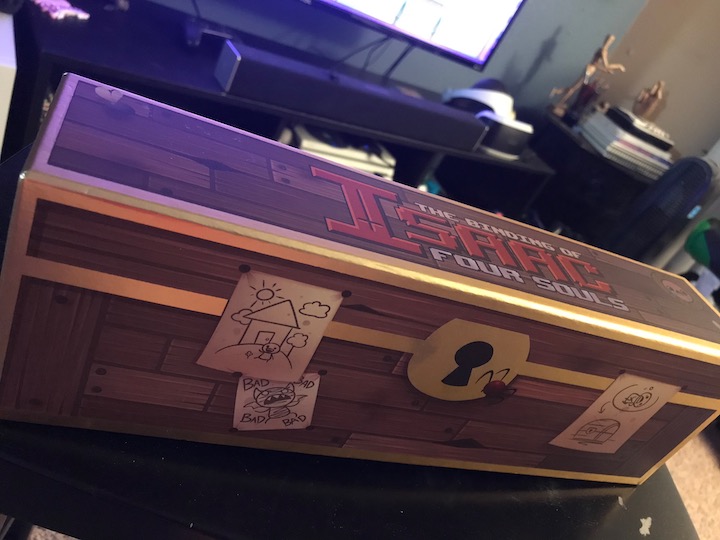
As anyone who has played Isaac knows, it involves the player traversing an ever increasingly grotesque series of rooms filled with monsters, insects, bosses, and yes, even poop. Along the way you collect a plethora of randomized items, weapons, and power ups which have synergistic properties that allow for near endless replayability as it’s rare to have the same run twice.
With expansions and updates that have upped the original release’s 196 items to almost 450, how does this translate into a card game? Surprisingly well, actually, considering that there are over 100 treasure cards in the base game and even more in the Gold Box Edition.
The general gist of the game is that 2-4 players compete against one another to defeat monsters and collect items/treasure in a quest to obtain four souls, with the winner being whoever reaches that goal first. As the instruction manual immediately points out “Co-operation, bartering, and betrayal are all strongly encouraged.”
Setting up the game is easy and minus the time it took to shuffle the game’s multiple decks of cards, my partner and I were almost always immediately able to start up a new round after a winner had been reached in a previous game.
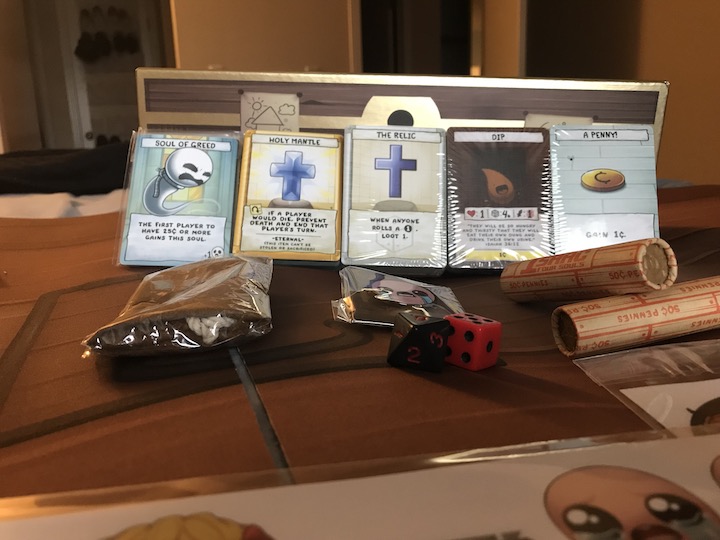
The layout of the game is fairly simple and straightforward. On the left side of the board goes the monster deck and on the right side goes the treasure deck. At the start of each game two cards from each are flipped over and those are the beasts and store items in play.
Within the middle of the board resides the item deck. Unlike the treasure deck which contains the strongest passive and active gameplay modifiers that sit permanently on the player’s side of the board unless destroyed, the item deck is filled mostly with coins, one time use power ups, and only the rare multi-use trinket here and there.
To begin each game player characters are randomly handed out. Unlike the video game where a player can choose who they want to do a dungeon run with, the card game encourages making it random as each character comes with different abilities and a non destroyable item in the form of an eternal treasure. Originally pitched with only four characters available, thanks to Kickstarter stretch goals the version of the game I obtained came with fifteen.
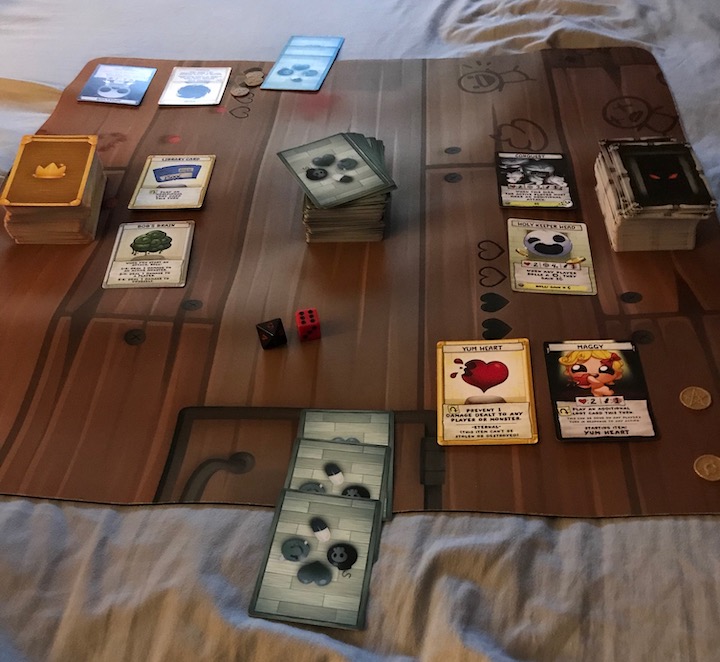
This randomized nature can lead to some incredibly fun and/or challenging runs.
In one game my partner drew the character The Keeper, who ensured she’d always have money on hand due to its associated item, The Wooden Nickel. This was a major advantage as evidenced by her constantly buying new treasures from the store, allowing her to fill up her side of the board with a massive collection of power ups and abilities.
Meanwhile, I was playing as The Lost who made combat an immense pain in the ass.
In the video game The Lost is the toughest character to finish a run as. Depicted as a ghostly figure, The Lost has no health, nor can it gain any. Basically if you take a single ping of damage you die. One of my proudest moments while playing The Binding Of Isaac was completing both the good and bad endings of the game with that character while playing on hard mode.
While not as tough as the actual video game, winning with The Lost in the card game was still a challenging hill to climb. Unlike most other characters who have two hearts, the Lost dies upon taking so much as one hit. Negated only by its eternal item, The Holy Mantle, which prevents death when tapped but immediately ends the turn.
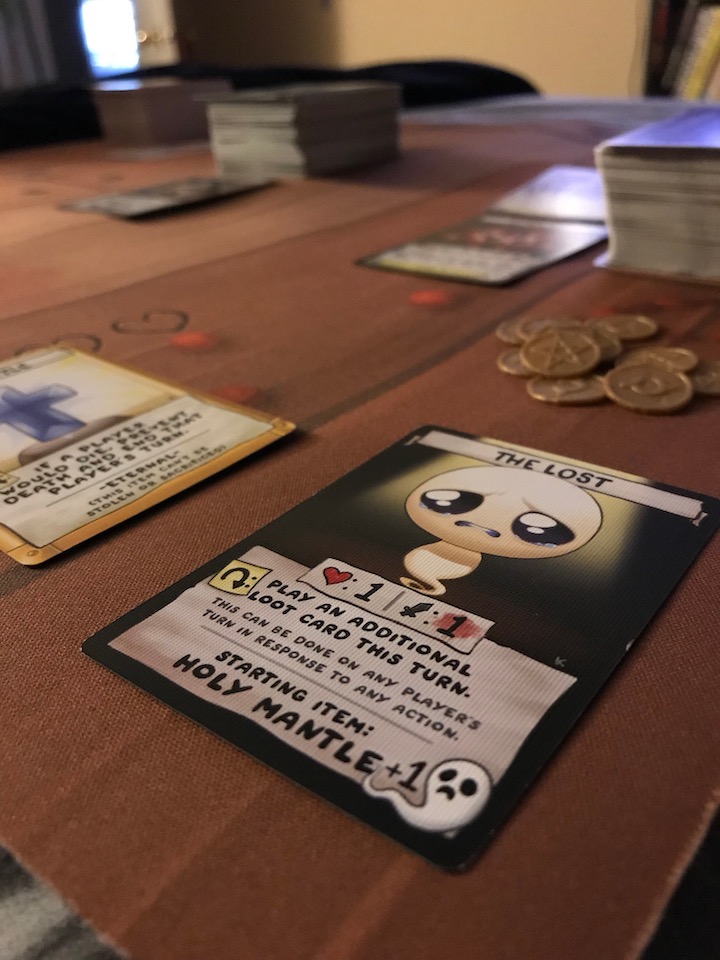
Essentially I had to always roll perfect numbers on the die lest I couldn’t make much progress. Combat within the game is straightforward enough, but due to the devious nature of the variety of cards in play, rarely did combat play out as expected.
Once per turn (except in special instances) a player can attack any of the monsters currently on the field, or they can risk fighting the unknown beast lurking at the top of the deck. Suppose what’s one the field is too insurmountable a challenge, a situation that occurred in my very first game when the first two monsters were difficult bosses, then attacking the top card of the monster deck might be worth the risk. In that moment you flip it over revealing it to all players and place it on top` of one of the monsters already loitering on the field.
When it’s decided what you will be fighting combat plays out by rolling a six sided die. Each monster card has three stats that dictate how difficult the creature will be. The first being a health meter, the second a die number which represents how high a number you must roll to inflict damage, and the third is a number which represents how much damage the monster will inflict on a player who fails to successfully roll the number represented by the second stat.
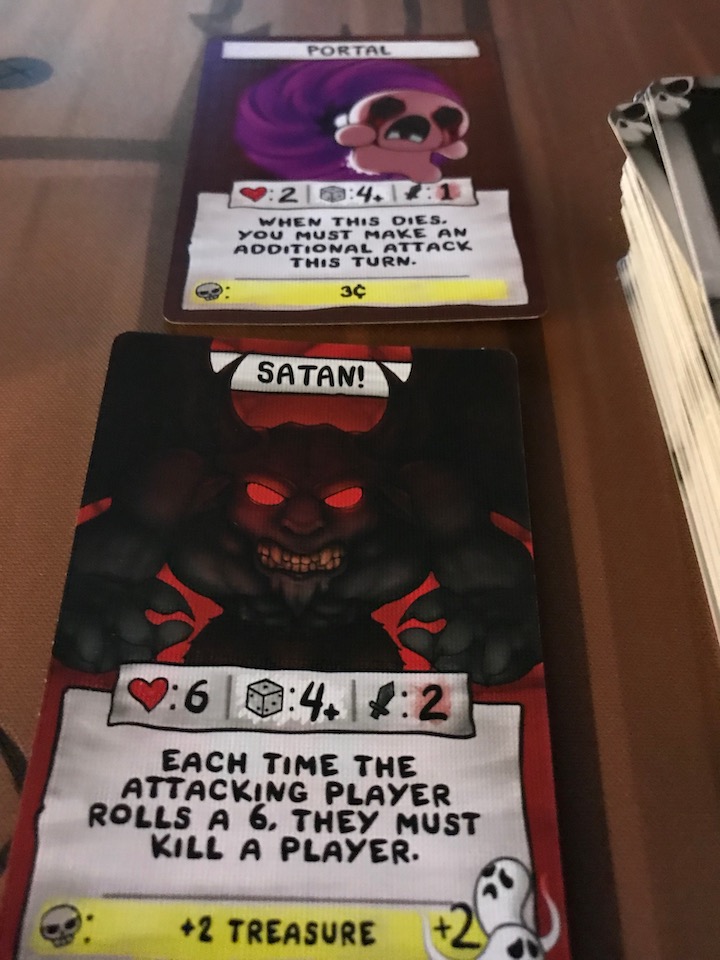
Towards the end of my game playing as the Lost my partner and I were tied for souls. Two to two. On the field was one boss creature who upon defeat would give the attacking player conveniently enough, two Souls. This monster also just so happened to be Mom. It was my turn and given the power ups my opponent controlled, she was sure to win if I passed up this opportunity to attack.
Mom had five health, required a die roll of four or higher to inflict damage, and she could attack me for two. Given my character could only be hit once, it was all or nothing.
At the start of my turn I drew my loot card, my hand was otherwise empty but I got a lucky draw, The gold bomb! This would instantly deal three damage to a monster or player. I immediately damage mommy.
She’s down to two health, a good prospect given I posses a trinket called Brimstone, this ups my attack by one. I only have to hit my mother once to win the game. I roll the die needing a four or higher, the piece of plastic stops bouncing and it’s a three…
All seems lost for the Lost but one other card I had on my end of the table comes into play, Cancer! This adds +1 to the first dice roll I make each turn, my three becomes a four and I win the game. Suck it mom.

If the above is any indication, combat can become a glorious mixture of power ups and items. Adding to the chaos is that opposing players can also use items during another player’s turn, so one must always be mindful of what other players possess. Thankfully during the moment described above there was nothing my partner could do to stop me, but in other games we had moments where we would utterly ruin a person’s otherwise perfect plan.
In one devious moment she had a variety of cards that let her do damage to me, and at the start of three different turns she killed me. Upon death I was forced to give up a coin, discard a loot card, and destroy one of my items in play. As the rule book says, it encourages betrayal, and this game gives many means to do so.
I only ever got to play with one other person, but in games with three or four people it’s safe to assume it would be a satisfyingly challenging and intense experience. Just only ever play with people who don’t get angry during rounds of Monopoly, because this game opens the door to being able to utterly ruin someone’s day.
Edmund McMillen has always come across to me as a creator worth praising. His games are unique and creativity shines through almost everything he does. He’s the type of developer I want to see continually succeed. What’s greater still, is that if The Binding Of Isaac Four Souls is any indication, we’ve yet to see the best of what he can offer.
Within this game is an amazing experience that constantly left me wanting more. After over a dozen games, no single playthrough felt the same. This is a card game that perfectly recaptures the magic of even the best the rougelike video game genre has to offer. If you ever have a chance to obtain this game come its retail release, I highly suggest you do. It’s the most fun I’ve had with a tabletop all year.